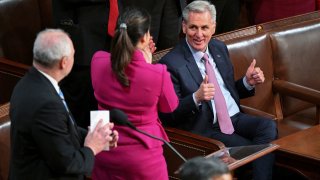
- Chief financial officers consulted by CNBC would not be surprised by a government shutdown this year, but continue to see the debt ceiling debate and risk of default as a low-risk probability.
- CFOs' downbeat assessment of Congress is more squarely focused on disappointment over the failure to save a key tax code section for R&D expensing from expiration.
- As companies set legislative and lobbying agendas for 2023, a key message will be about the investments that won't be made and jobs that will be lost if political dysfunction leads to a market crash and recession.
The recent drama over the election of House Speaker Kevin McCarthy, which ratcheted up fears of a government shutdown and debt ceiling showdown in 2023, caught the C-Suite's attention, just like it did everyone else. Chief financial officers on the CNBC CFO Council told us that the surprising power moves on Capitol Hill led them to take some quick actions: meeting with senior leaders and/or their board of directors to discuss how it might affect the company; reconsidering their legislative affairs strategy; and a few who told us they reached out to members of Congress directly.
A few more CFOs shared a blunt, more personal reflection with us, saying all they did was, "Watch in disbelief."
Translating the disbelief and Washington dysfunction into strategic planning and risk management is tougher now than it might have seemed under a GOP-controlled House, but it's happening. The midterm election results made it clear that even with GOP control, it wasn't as solid as corporate interests would have preferred to see for their agenda to move forward. And the subsequent developments are adding to the downbeat assessment.
Get Boston local news, weather forecasts, lifestyle and entertainment stories to your inbox. Sign up for NBC Boston’s newsletters.
In our regular Q4 CNBC CFO Council survey, before the year-end spending bill was finalized and before the House Speaker headlines and concessions made to the most conservative factions within the GOP, there was little risk seen by CFOs of a government shutdown and virtually no risk of a debt ceiling default.
But in a flash survey of members conducted this month, risk of government shutdown was being seen as a real risk by many more CFOs, though the debt ceiling was still being assessed as a low probability event.
When we held our annual CFO Council Summit in Washington, D.C. at the end of November, several top figures on the Hill downplayed the risk of debt default by the U.S. government. Kevin Brady, the former top Republican on the House Ways and Means Committee, dismissed talk of debt default as "fear mongering." Oregon Democratic Senator Ron Wyden told CFOs "paying the bills" in a bipartisan way and a "clean" debt ceiling bill is always the way to go when the issue is the "full faith and credit" of the United States of the America. But the GOP infighting and recent history of conservatives using the debt ceiling as a political weapon suggests that low risk is not no risk and could become a graver risk yet.
Money Report
The debt ceiling posturing will remain a threat for months to come, with GOP lawmakers targeting major government programs ahead of a June deadline, and the Biden administration expected to wait until after the April tax season to push for an increase in the debt limit. From the Senate, Mitch McConnell recently said it's an issue for Biden and the House GOP to work out. And it is already having a material impact on federal government decisions, with the Treasury suspending some new investments slated for government retirement systems, one of the so-called "extraordinary measures" Treasury Secretary Janet Yellen is taking to avoid default until Congress raises the federal borrowing limit.
From the market's view, the risk isn't imminent, but it is not too early to start planning. As JPMorgan's North American Research Team noted on Friday, "a default on the federal debt is something that has never happened in the history of the republic. The implication of such an event for confidence, financial markets, and the overall economy are hard to quantify, but could plausibly result in a severe recession. That would be the worst-case outcome, of course, but even the best case will probably see the sort of brinksmanship that occurred in the 2011 debt ceiling crisis."
To make sense of the situation, we checked in with a few senior industry leaders with D.C. experience to share their thoughts on how C-suites should be managing the politics of 2023 as it relates to the balance sheet and markets.
For now, debt ceiling is just talk, but government shutdown is a real risk
Rohit Kumar, Washington National Tax Services Co-Leader at PwC, who served as a top aide to Mitch McConnell during the debt ceiling drama of 2011, says he sees no increased risk of a debt default, but the odds of government shutdown are likely greater than 50%, maybe much greater.
The good news? For any business or worker that does not rely on government contracts for the majority of their revenue or pay, the history of shutdowns is that they are "totally survivable," he said. Kumar estimated that he has been through roughly 20 shutdowns during his time in D.C. "We always put Humpty Dumpty back together again. It is highly disruptive … but we make it work," he said.
That's the view of JPMorgan in its note on Friday to investors making sense of the politics of 2023 as well: "There have been dozens of federal government shutdowns—usually with no effect on the economy," it wrote.
Narrowness of GOP House majority does matter
JPMorgan also referred to the path for a political agreement as being "narrow."
The debt limit talks may go down to the "bitter end," Kumar said, and he says it is right to be more concerned about the narrowness of the GOP majority and the Republican Party having what he called a "unified opening bid" on the debt limit. "That's where the narrowness of the majority is a hindrance," he said. The party's ability to unify around a negotiating position, or not, will reveal the strength or weakness of its hand.
The stock market is clearly not responding to the debt ceiling risk to start the year, with a rally that has been built on hopes that inflation is on a trajectory that remains lower while avoiding the recession that many still fear will be an ultimate consequence of Fed interest rate hikes.
Dustin Stamper, managing director in Grant Thornton's Washington National Tax Office, said the first place to look for the debt ceiling risk becoming real is in the stock market, and that won't be until later this year. Boardrooms won't react until stocks do.
"I don't know if business will take it seriously, unless markets crack," Stamper said. "Most businesses are not at the point where they are thinking the risk is so great, they need to plan around it."
The unchanged, if magnified and more general, concern is that it's going to be harder to legislate anything, and beyond a few issues where bipartisan support is widespread, including China and cryptocurrencies, "you have to lower your general ambition level for Congress," said Kumar. "We knew it was a divided government and now you need to lower it maybe a little more."
A big R&D omission in year-end spending bill
Case in point: the year-end spending bill that didn't deal with the expiration of the immediate R&D expense treatment.
Back at our CFO Council Annual Summit in November, Sen. Wyden sounded optimistic about Congress dealing with R&D expenses and the bipartisan support that existed for the measure in the lame duck session.
Our recent CFO council survey on the Speaker vote and debt ceiling included as many open-ended responses about this failure as anything else political in nature on CFOs' minds. "Every business in America cares about the ability to immediately deduct R&D expenses," Kumar said. The R&D expense measure had roughly 40 cosponsors in the Senate and well over 100 in the House. "The issue is not, 'is there agreement?' It's what are the collateral things that want to get attached and are those bipartisan or not," Kumar said.
Last year, it was the Child Care Tax Credit.
"These disagreements get harder to resolve and it introduces the possibility Congress just doesn't get to it," he said.
Deciding how to invest in a more cautious economy
Stamper described it as a "major blow" when hopes the R&D tax code would be fixed before the end of the year didn't materialize. "It's a very big deal and the longer it remains unfixed, the more it could have a negative impact on how much companies spend on research … it's a disincentive to continue to invest in business," he said.
Sean Denham, Grant Thornton's National Audit Growth Leader, said cash flow impact to the organization from R&D will receive even more scrutiny now, and the investment in R&D potentially viewed as lower return, especially in the short term. "They need to be investing in R&D, but they're trying to understand if we are going to enter a recession, what are the levers they can pull," he said.
Where and when there may still be a slim legislative opening
Stamper said there is still "heavy lobbying" going on related to R&D tax treatment, but he added that most financial officers have "given up" and are moving forward under the assumption it doesn't get restored.
The last best chance for a tax package moving the R&D expense treatment back into the conversation, according to Kumar, may relate to the new 1099 income requirements related to Venmo and PayPal transactions, which was shelved for the current tax year, but which the Democrats and President Biden want to see addressed on a statutory basis.
"This was marked as a transition year and I would be more than a little surprised if they can run that delay plan a second year in a row," he said. "It either gets a statutory fix or not. And that will become an urgent issue in the second half of the year, and it may become a vehicle for tax changes. It will attract other attention," he said. But he described this as a "mild increase" in the odds for R&D.
For now, "The U.S., from a tax perspective, it's just a really bad place to incur R&D expenses," Kumar said.
How to get a message heard on Capitol Hill
There is only one message for CFOs and CEOs to send to Capitol Hill, and it's not expressing their displeasure about having to pay more in taxes. "Very few are moved by that argument," Kumar said.
"CFOs and CEOs just need to be straightforward," he said. "'In the absence of a fix, here are the investments we were planning to make which we won't, or which we are deferring.' … the real-world consequences of failure to act here."
That's an approach the former Hill staffer shared that is also consequential in the case of the debt limit.
In 2013, the Federal Reserve ran a simulation of a debt default by the U.S. government. The central bank's best guess:
- Stocks decline by 30%.
- Private spending is cut by about one-third to one-half.
- The economy falls into a mild recession for two quarters and unemployment spikes.
PWC's model today doesn't have debt default as a likely outcome. JPMorgan's analysis on Friday indicated that in a worst-case scenario, foreign investors could flee U.S. bonds, leading to a dollar spike and renewed inflation; access to credit be cut off to private markets; a panic among investors in money market funds ensue; and any perceived weakness in Treasury securities would have an "adverse cascading effect on the stability and functioning of other financial markets."
"The sum of these potential effects is hard to quantify. We think it is very likely a default would lead to a contraction in economic activity. We believe it is also quite plausible that it would precipitate a severe financial crisis."
Kumar said the message from C-Suites to a divided government should focus in on specific economic harm. "Here is what it means for us if our market cap drops because the stock market is down 30%, here is the consequence for us," he said. "The Fed simulation was just numbers, but it has to become the real world. What does it mean for a firm, for its ability to invest and hire. That's the conversation they need to be having with their lawmakers," Kumar said. "They won't be interested in what you say about Medicare reform."
Denham said since last January many firms have been conducting scenario-planning related to the labor market, the supply chain and rising rates, all the factors that have changed and have repercussions within the macroeconomic environment. "This is another data point, another wrinkle in the scenario planning," he said. "I do talk to CFOs and boards quite frequently, and this is something they are watching and monitoring and putting into different scenario plans, but it is wait-and-see mode."
At least as of now, "I don't think they expect the catastrophe to happen," he said.






